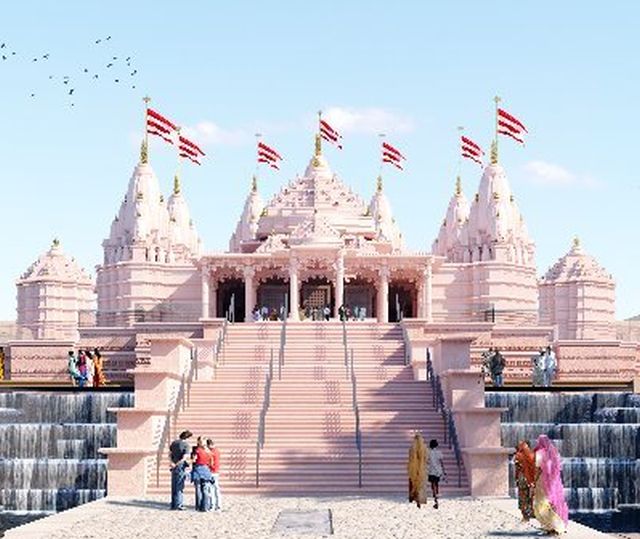
Mumbai, Feb 15 (IANS) The grand Hindu temple in Abu Dhabi, UAE that was inaugurated on Wednesday by Prime Minister Narendra Modi, has a strong Mumbai connection as it was built by a Parsi group.
The Bochasanwasi Akshar Purushottam Sanstha (BAPS) Swaminarayan Sanstha’s temple, the first Hindu temple made of stone in the Middle-East was built by the Shapoorji Pallonji Group of Mumbai.
The BAPS Hindu Temple belongs to one of the branches of the famous Swaminarayan Sampradaya founded by Sahajanand Swami (1781-1830), around 117-years ago in south Gujarat, with over five crore followers worldwide.
The BAPS temple is billed as an architectural marvel, towering loftily over the golden sandy landscape, with seven spires symbolising the seven emirates of the UAE.
It is sprawled over 27 acres of desert land on the outskirts of Abu Dhabi, on a plot generously donated by UAE’s President, His Highness Sheikh Mohamed Bin Zayed Al Nahyan.
The temple is open to people of all faiths and serves as a testament to India’s culture, its ancient skills in architecture and sculpture. It has been built in strict accordance with age-old Indian texts and derives its inspiration from a lotus motif.
“We are deeply honoured to work with the BAPS and create this incredible monument that combines art, harmony and faith, and besides being a celebration of cultural diversity, it’s a testament to our engineering expertise,” said Shapoorji Pallonji Group Chairman, Shapoorji P Mistry.
“Our dream of a Hindu mandir in Abu Dhabi has now become a reality. The Shapoorji Pallonji Group played a pivotal role in partnering with us to create this lotus in the desert, and bringing to life our vision of this spiritual oasis for global harmony,” said BAPS Director, Pranav Desai.
The BAPS Swaminarayan Sanstha also has several other temples in India and around the world, and the Abu Dhabi monument would help strengthen bilateral ties between India and the UAE.
The temple complex has seven ancillary buildings, which can cater to over 15,000 devotees daily, and has distinctive water features, representing the three major holy rivers of India, the Ganga, Yamuna, and Saraswati.
The main temple is built on a raft foundation using the UAE’s largest single pour of unreinforced fly-ash concrete. Bamboo sticks and fibreglass have been used instead of iron and steel reinforcements.
The temple façade has come up on this foundation, using 40,000 cubic meters of marble from Italy and 180,000 cubic meters of Pink Sandstone from Rajasthan.
Thousands of artisans and volunteers intricately carved the stones in Rajasthan, for the BAPS temple, and these were then taken to Abu Dhabi and put together like a giant jigsaw puzzle.
For this project, Shapoorji Pallonji successfully integrated modern technology such as security, lighting systems and air-conditioning with the traditional requirements of ancient Indian architecture.
Established in 1865, the 159-year-old Shapoorji Pallonji Group has other landmarks to its credit including the Sultan’s Palace in Muscat (Oman), the Atal Tunnel in Himachal Pradesh, the Kartavya Path in New Delhi, Port Blair Airport, and Mumbai’s first auditorium, the Shanmukhananda Hall, and it has also produced India’s all-time classic masterpiece film, ‘Mughal-E-Azam’ (1960).
The 117-year-old BAPS Swaminarayan Sanstha is headed by Shastriji Maharaj Yagnapurushdasji Swami. It is an offshoot of the Swaminarayan Sect, with two establishments Vadtaal Gadi, near Vadodara, (for south India) headed by Vadtaal Peethadhipati Acharya Shri Rakeshprasadji Maharaj, and the Kalupur Gadi near Ahmedabad (for north India), headed by Kalupur Peetadhipathi Acharya Shri Kaushalendraprasadji Maharaj.
The Swaminarayan Sect’s eye-catching temples and other buildings decorate several cities around the world which are frequented by people irrespective of caste or religion.




